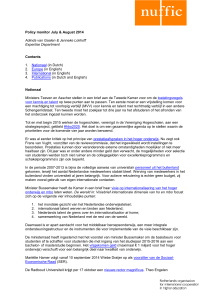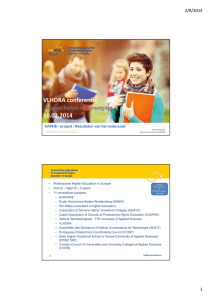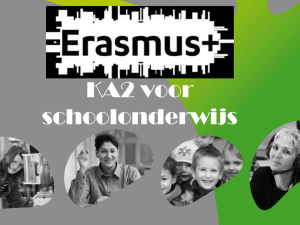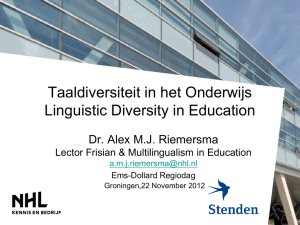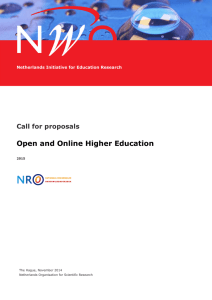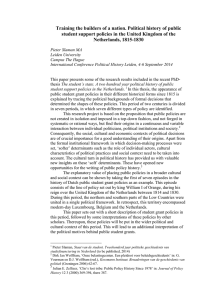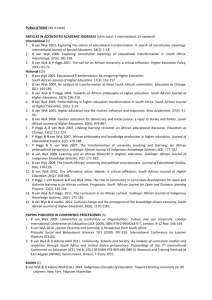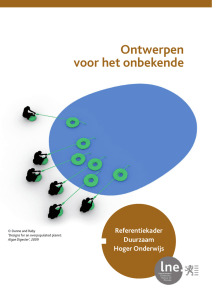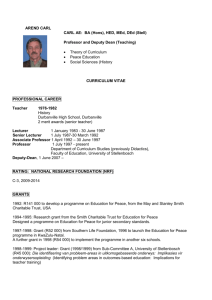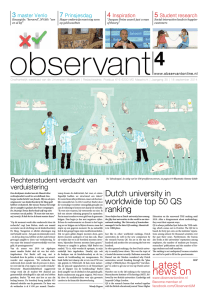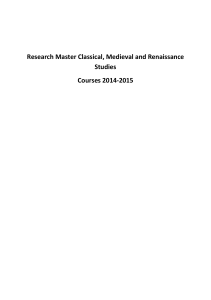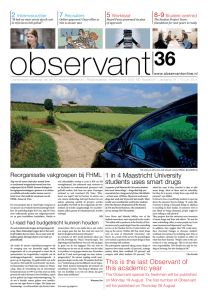Download de Beleidsmonitor april 2014
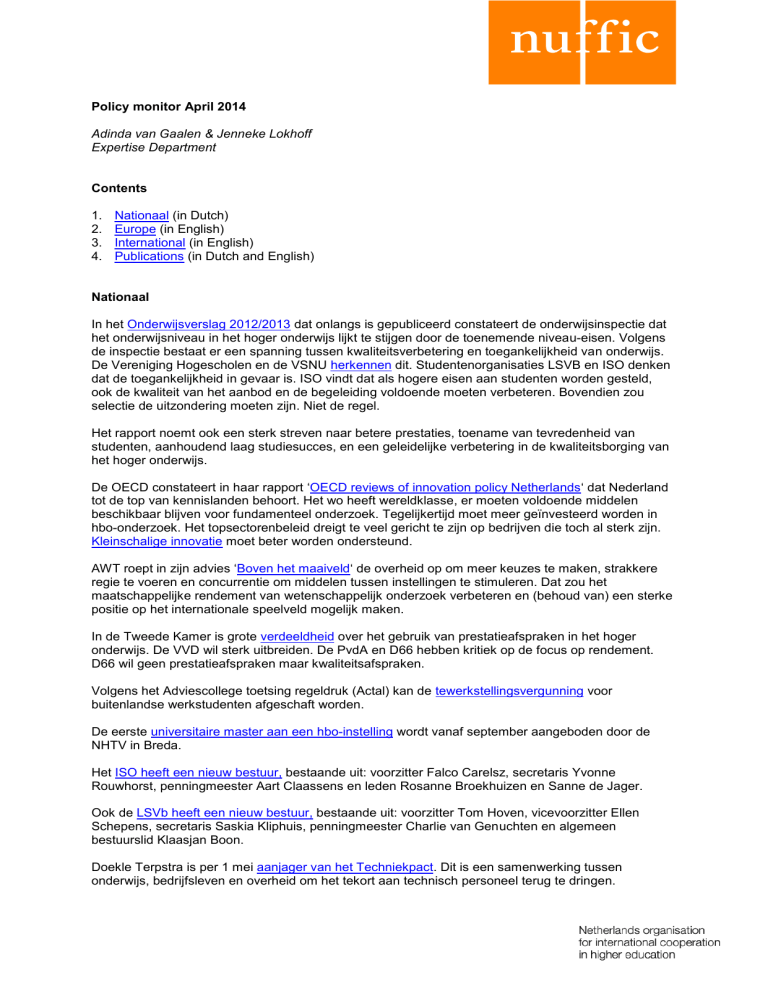
Policy monitor April 2014
Adinda van Gaalen & Jenneke Lokhoff
Expertise Department
Contents
1.
2.
3.
4.
Publications (in Dutch and English)
Nationaal
In het Onderwijsverslag 2012/2013 dat onlangs is gepubliceerd constateert de onderwijsinspectie dat het onderwijsniveau in het hoger onderwijs lijkt te stijgen door de toenemende niveau-eisen. Volgens de inspectie bestaat er een spanning tussen kwaliteitsverbetering en toegankelijkheid van onderwijs.
De Vereniging Hogescholen en de VSNU herkennen dit. Studentenorganisaties LSVB en ISO denken dat de toegankelijkheid in gevaar is. ISO vindt dat als hogere eisen aan studenten worden gesteld, ook de kwaliteit van het aanbod en de begeleiding voldoende moeten verbeteren. Bovendien zou selectie de uitzondering moeten zijn. Niet de regel.
Het rapport noemt ook een sterk streven naar betere prestaties, toename van tevredenheid van studenten, aanhoudend laag studiesucces, en een geleidelijke verbetering in de kwaliteitsborging van het hoger onderwijs.
De OECD constateert in haar rapport ‘ OECD reviews of innovation policy Netherlands ‘ dat Nederland tot de top van kennislanden behoort. Het wo heeft wereldklasse, er moeten voldoende middelen beschikbaar blijven voor fundamenteel onderzoek. Tegelijkertijd moet meer geïnvesteerd worden in hbo-onderzoek. Het topsectorenbeleid dreigt te veel gericht te zijn op bedrijven die toch al sterk zijn.
Kleinschalige innovatie moet beter worden ondersteund.
AWT roept in zijn advies ‘ Boven het maaiveld ‘ de overheid op om meer keuzes te maken, strakkere regie te voeren en concurrentie om middelen tussen instellingen te stimuleren. Dat zou het maatschappelijke rendement van wetenschappelijk onderzoek verbeteren en (behoud van) een sterke positie op het internationale speelveld mogelijk maken.
In de Tweede Kamer is grote verdeeldheid over het gebruik van prestatieafspraken in het hoger onderwijs. De VVD wil sterk uitbreiden. De PvdA en D66 hebben kritiek op de focus op rendement.
D66 wil geen prestatieafspraken maar kwaliteitsafspraken.
Volgens het Adviescollege toetsing regeldruk (Actal) kan de tewerkstellingsvergunning voor buitenlandse werkstudenten afgeschaft worden.
De eerste universitaire master aan een hbo-instelling wordt vanaf september aangeboden door de
NHTV in Breda.
Het ISO heeft een nieuw bestuur, bestaande uit: voorzitter Falco Carelsz, secretaris Yvonne
Rouwhorst, penningmeester Aart Claassens en leden Rosanne Broekhuizen en Sanne de Jager.
Ook de LSVb heeft een nieuw bestuur, bestaande uit: voorzitter Tom Hoven, vicevoorzitter Ellen
Schepens, secretaris Saskia Kliphuis, penningmeester Charlie van Genuchten en algemeen bestuurslid Klaasjan Boon.
Doekle Terpstra is per 1 mei aanjager van het Techniekpact . Dit is een samenwerking tussen onderwijs, bedrijfsleven en overheid om het tekort aan technisch personeel terug te dringen.
Europe
Following the Commission’s communication published its ‘Opening Up Education’ – calling for more
ICT skills and innovation in education – the European Parliament adopted the report on New technologies and open educational resources .
In Finland the results of a fee trial (2010-2014) were published . The trial period was considered not to have fulfilled all the initial expectations but still having contributed positively to the development of the internationalisation of Finnish higher education in general.
Denmark launched a new action plan to attract more foreign students. The action plan contains 24 concrete initiatives and 5 strategic measures, including: 1) better international dimension of study programmes and environments, 2) attract more talented fee-paying students, 3) bring back drop-out rate of international students, 4) more international students should remain in Denmark upon completion of their studies and 5) must have the same employment ratio as Danish graduates.
Across Europe, the Erasmus+ programme has officially been launched this month. The programme was not rolled out in Switzerland, due to the outcomes of a referendum, proposing migration quota on
Croatian citizens. On 16 April, Switzerland presented an interim solution to compensate for the loss of being a ‘programme country’ of Erasmus+. The costs initially reserved for Erasmus+ will now be allocated to the following priority areas: mobility, vocational education and training, youth work and adult education. Regarding Horizon 2020, the European Commission has said it will consider improving Switzerland's status.
The Swedish government announced that its current quality assurance model in higher education is to be reviewed.
Spanish and Portuguese rectors met at the University of Minho in April 2014, intending to position the
Iberian Peninsula as a reference and attract students from Latin America. The conference ended with a declaration .
On 14 April the European Multiple MOOC Aggregator ( EMMA) was launched. The platform hosts multilingual MOOCs. Apart from hosting MOOCs, the EMMA platform will also provide a flexible learning space.
Germany has a new brand name for its international vocational education and training cooperation:
GOVET - ‘German Office for International Cooperation in Vocational Education and Training’.
On 15 April, the European Consortium for Accreditation became officially an association .
In France, Benoît Hamon (46), is the new Minister for enlarged Ministry of National Education, Higher
Education and Research.
International
Russia adopted the Global Education Programme. The programme will allow 3,000 Russian students to pursue graduate and postgraduate studies in the world’s leading universities.
On 2 April, China published its Policy Paper on the EU: ‘Deepen the China-EU Comprehensive
Strategic Partnership for Mutual Benefit and Winwin Cooperation’. In section IX ‘Cooperation in the
Fields of Education, Culture, Press, Publication and Youth Exchange’ China formulates various goals regarding cooperation between the two regions, e.g. to strife for an increase of student mobility.
Heads of libraries from eight Member States of the West African Economic and Monetary Union
(UEMOA) agreed to build a network of local virtual libraries in order to create a sub-regional virtual library with resources for students and researchers.
After two universities changed their academic calendar, the Commission on Higher Education in the
Philippines discouraged universities to follow the example.
2
Kenya, Rwanda and Uganda have agreed to charge local fees to students moving to study between the three countries. This is one step in harmonisation of education in the East African Community
(EAC).
Publications
Jelena Brankovic, Maja Kovacevic, Peter Maassen, Bjørn Stensaker, Martina Vukasovic (Eds.).
The
Re-Institutionalization of Higher Education in the Western Balkans . Peter Lang. 2014.
Jelena Brankovic, Manja Klemencic, Predrag Lazetic and Pavel Zgaga (Eds .). Global Challenges,
Local Responses in Higher Education: The Contemporary Issues in National and Comparative
Perspective.
Sense. 2014.
Chirwa. Higher Education Councils and Commissions in Africa: A comparative study of the legal basis of their establishment, functions, autonomy and accountability.
Centre for Higher Education
Transformation (CHET). 2014.
Cedefop . On the way to 2020: data for vocational education and training policies . 2014.
Cedefop, Qualifications at level 5: progressing in a career or to higher education . 2014.
European Commission, Study on Policy Measures to improve the Attractiveness of the Teaching
Profession in Europe . Vol 1 and vol2. 2014.
European Commission , Report on Higher Education Internationalisation Policy and Strategy [EU and
Thailand]. 2014.
Edwin Goñi, William F. Maloney . Why Don’t Poor Countries Do R&D ? The World Bank Development
Research Group. March 2014.
Futao Huang, Martin Finkelstein and Michele Rostan (Eds).
The Internationalization of the Academy.
Changes, Realities and Prospects.The Changing Academy – The Changing Academic Profession in International Comparative Perspective 10.
Springer. 2014.
Martin Lawn & Sotira Grek, Europeanizing Education governing a new policy space . Symposium
Books. 2014.
McDermott, D. Report on higher education internationalisation Policy and Strategy .(TEC II), Bureau of
International Cooperation Strategy, The Office of the Higher Education Commission, Bangkok.
OECD. PISA 2012 Results: Creative Problem Solving: Students’ Skills in Tackling Real-Life Problems
(Volume V).
Rathenau Instituut . Vizier vooruit. 4 toekomstscenario’s voor Nederlandse universiteiten.
SBB. Opleidingen met beperkt arbeidsmarktperspectief.
Stichting Samenwerking Beroepsonderwijs
Bedrijfsleven.
Steven D. Krause and Charles Lowe (Eds).
Invasion of the MOOCs. The Promise and Perils of
Massive Open Online Courses.
Parlor Press. 2014.
IAU.
Internationalization of Higher Education: Growing expectations, fundamental values . IAU 4th
Global Survey. April 2014.
UNESCO – IIEP.
The diversification of post-secondary education . 2014.
UNESCO – IIEP. External quality assurance: options for higher education managers . 2014.
3
Maria João Rosa, Alberto Amaral (Eds.).
Quality Assurance in Higher Education. Contemporary
Debates. Issues in Higher Education.February
. Palgrave. 2014.
UNESCO. Position Paper on Education Post-2015 . 2014.
UNESCO. Governance reforms in higher education: a study of institutional autonomy in Asian countries
Universities UK.
The Impact of universities on UK economy . Universities UK. April 2014.
The policy monitor is published monthly by Nuffic’s Expertise Department. The monitor tracks policy developments in the internationalisation of higher education. Contact: jlokhoff@nuffic.nl
or avangaalen@nuffic.nl
.
4
